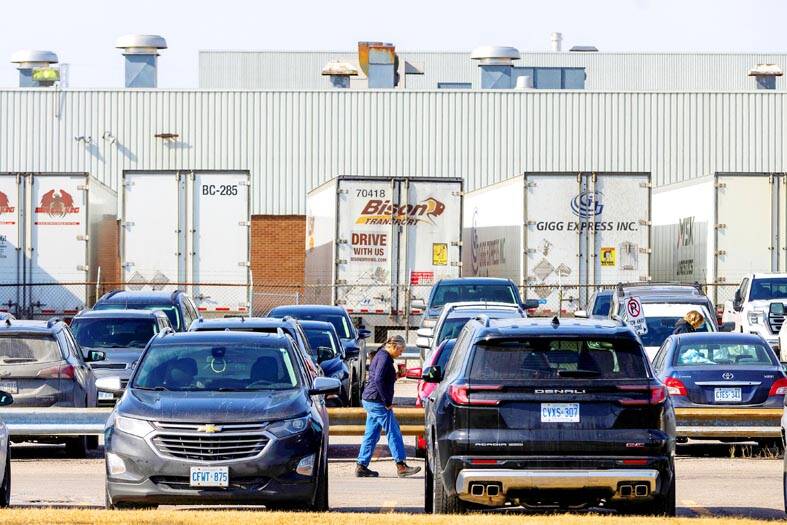The administration of US President Donald Trump is considering whether to reduce certain tariffs targeting the auto industry that automaker executives have warned would deal a severe blow to profits and jobs.
One measure would spare automobiles and parts already subject to tariffs from facing additional duties from levies on steel and aluminum imports, people familiar with the matter said.
That would eliminate so-called “stacking” of levies.

Photo: Reuters
Another option being studied would fully exempt auto parts that comply with the US-Mexico-Canada trade pact (USMCA), some of the people said.
Those components do not currently face tariffs, but the administration had planned to tax the non-US share of those parts from Canada and Mexico. Fully sparing those parts would abandon that approach, which would present a potentially herculean logistical challenge.
The Financial Times reported that the Trump administration is considering reducing tariffs on auto parts — and that it might also exempt auto parts bought from China from a 20 percent tariff applied to the nation over a dispute over fentanyl.
The proposals and options remain under consideration, and Trump has not signed off, said the people, who asked not to be identified discussing the matter, because it is not public.
Trump’s tariff policies often change quickly, underscoring the fluidity of policy deliberations, but the discussions offer a signal that the administration is considering ways to narrow the scope of levies affecting the auto industry.
If adopted, the changes would be a significant reprieve for automakers, who have warned of devastating consequences from the tariffs, including higher vehicle prices, production cuts and potential job losses. The industry relies on deeply integrated supply chains spanning North America for the vehicles they sell in the US.
Trump has separately applied tariffs on goods from Canada and Mexico, although exempted USMCA-compliant goods.
The tariffs on autos and auto parts were poised to heavily disrupt the integrated continental supply chain. The US plan, as initially announced, offered something of an olive branch by applying tariffs only on the non-US share of USMCA-traded vehicles, and delaying a potential tariff on parts traded under the pact.
The White House did not respond to a request for comment on Wednesday night.
Asked if he was considering changes to auto tariffs, Trump on Wednesday indicated he was not, while also suggesting he might even increase levies on the Canadian auto sector.
“No, we’re not considering it now, but at some point it could go up,” Trump said. “Because, again, we don’t really want Canada to make cars for us. To put it bluntly, we want to make our own cars, and we’re now equipped to do that.”
Detroit’s automakers for weeks have lobbied the administration to exclude certain low-cost car components from planned tariffs.
Company representatives have told the administration that broad parts duties would drive up costs, and trigger profit warnings and layoffs that would counter Trump’s goal of rebuilding US manufacturing.
Trump plans to travel to Michigan next week.
Automakers are expected to shoulder much of the tariff burden, at least initially, with margins at many parts manufacturers already running thin.

POWERING UP: PSUs for AI servers made up about 50% of Delta’s total server PSU revenue during the first three quarters of last year, the company said Power supply and electronic components maker Delta Electronics Inc (台達電) reported record-high revenue of NT$161.61 billion (US$5.11 billion) for last quarter and said it remains positive about this quarter. Last quarter’s figure was up 7.6 percent from the previous quarter and 41.51 percent higher than a year earlier, and largely in line with Yuanta Securities Investment Consulting Co’s (元大投顧) forecast of NT$160 billion. Delta’s annual revenue last year rose 31.76 percent year-on-year to NT$554.89 billion, also a record high for the company. Its strong performance reflected continued demand for high-performance power solutions and advanced liquid-cooling products used in artificial intelligence (AI) data centers,

SIZE MATTERS: TSMC started phasing out 8-inch wafer production last year, while Samsung is more aggressively retiring 8-inch capacity, TrendForce said Chipmakers are expected to raise prices of 8-inch wafers by up to 20 percent this year on concern over supply constraints as major contract chipmakers Taiwan Semiconductor Manufacturing Co (TSMC, 台積電) and Samsung Electronics Co gradually retire less advanced wafer capacity, TrendForce Corp (集邦科技) said yesterday. It is the first significant across-the-board price hike since a global semiconductor correction in 2023, the Taipei-based market researcher said in a report. Global 8-inch wafer capacity slid 0.3 percent year-on-year last year, although 8-inch wafer prices still hovered at relatively stable levels throughout the year, TrendForce said. The downward trend is expected to continue this year,

A proposed billionaires’ tax in California has ignited a political uproar in Silicon Valley, with tech titans threatening to leave the state while California Governor Gavin Newsom of the Democratic Party maneuvers to defeat a levy that he fears would lead to an exodus of wealth. A technology mecca, California has more billionaires than any other US state — a few hundred, by some estimates. About half its personal income tax revenue, a financial backbone in the nearly US$350 billion budget, comes from the top 1 percent of earners. A large healthcare union is attempting to place a proposal before

Vincent Wei led fellow Singaporean farmers around an empty Malaysian plot, laying out plans for a greenhouse and rows of leafy vegetables. What he pitched was not just space for crops, but a lifeline for growers struggling to make ends meet in a city-state with high prices and little vacant land. The future agriculture hub is part of a joint special economic zone launched last year by the two neighbors, expected to cost US$123 million and produce 10,000 tonnes of fresh produce annually. It is attracting Singaporean farmers with promises of cheaper land, labor and energy just over the border.